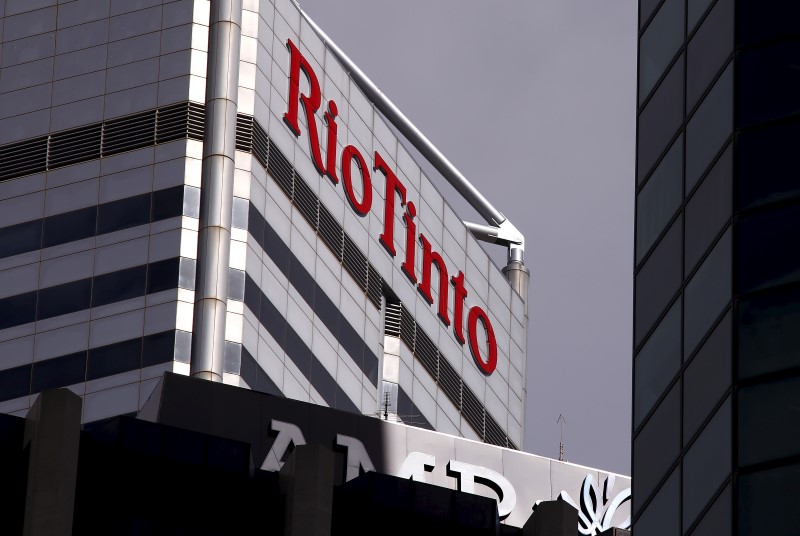(The opinions expressed here are those of the author, a columnist for Reuters.)
By Clyde Russell
LAUNCESTON, Australia, May 3 (Reuters) - It may not sound like a lot, but the 18 percent of Rio Tinto (LON:RIO) RIO.AX shareholders that voted in favour of a resolution that effectively called on the company to do more to address climate change have launched a snowball at the top of a large mountain.
The vote at Rio's May 3 annual general meeting called upon the world's second-largest mining company to review its membership of the Minerals Council of Australia (MCA) and other lobby groups.
While the vote was easily defeated, it sends a very clear message to natural resource companies that investors are going to be paying more attention to environmental credentials in the future.
The 18 percent support was said by the resolution's lead sponsor, Brynn O'Brien of the Australasian Centre for Corporate Responsibility, to be the "highest vote ever on a similar issue," the Sydney Morning Herald reported.
It's also worth noting that among the supporters of the resolution were life assurers such as Aegon and Legal & General, as well as pension funds like the Church of England Pensions Board.
Investors such as these make up the backbone of institutional shareholders of companies such as Rio Tinto, and the clear trend in recent years has been toward calling on company boards to be clearer in their commitment to the health of the global environment.
For its part Rio defended its climate stance, with new chairman Simon Thompson acknowledging that the company's exit from coal mining has been partially driven by climate change concerns.
But he also said Rio preferred to engage with groups such as the MCA rather than walk out over differences in climate change policies.
But as can be seen from BHP's BHP.AX recent decision to leave the World Coal Association, it's becoming increasingly hard for mining companies that are trying to nurture progressive public images to remain engaged with groups that promote fossil fuels, and are often sceptical of scientific evidence that burning such fuels contributes to climate change.
In some ways, targeting Rio is a tad odd given the company recently completed its exit from coal mining with the $2.25 billion sale in March of its Kestrel mine in Australia's Queensland state.
Rio, unlike BHP, decided that coal was no longer a long-term fit for its portfolio and took advantage of strong prices for the polluting fuel to sell its portfolio of mines.
COAL SCARCITY
It's inevitable that companies that remain in coal mining, especially those with listings in developed countries, such as BHP, Glencore GLEN.L and Anglo American AAL.L , will face rising shareholder pressure.
This will make it harder for companies to develop or expand coal mines and related infrastructure facilities, which is the obvious aim of the environmental groups and their supporters.
The struggles of Indian conglomerate Adani Enterprises ADEL.NS to build its planned Carmichael mine in Queensland and export the coal through its existing Abbot Point terminal is a case in point.
Despite having all the necessary government approvals and claimed customers for the coal, Adani has so far been unable to attract financing for the project.
In fact, the Carmichael mine looks increasingly unlikely to be developed as political support starts to wane in Australia, with Queensland's Labor Party-led state government ruling out support and the Liberal Party of Prime Minister Malcolm Turnbull, which backs the mine, behind in the polls ahead of next year's likely election.
Coal's difficulties are also amplified by policies in the two major importing nations, China and India.
China wants to use less of the fuel in order to improve air quality, and India wants to import less in order to improve its current account balance, however, it's dreadful pollution may well result in more stringent environmental policies in the future.
The irony of the success of anti-coal activism and stricter environmental rules is that coal is likely to become a scarcer commodity.
Demand for seaborne supplies is likely to increase in coming years because of investment decisions made in previous years to build coal-fired plants, particularly in Asia.
But it's becoming harder to see coal-exporting countries being able to boost output, given political challenges in top shipper Australia and diversion of exports to local demand in number two exporter Indonesia.
Coal prices have responded to this by remaining robust, with the Newcastle Weekly Index GCLNWCWIDX , a benchmark for Australian thermal coal, ending at $95.25 a tonne on April 27, the 40th straight week it has been above the $90 level.
Perhaps the final irony for coal is that it is dying, but its going to be a profitable death for those who can stick it out to the end. (Editing by Richard Pullin)
